Improve yourself the Kaizen way: How to progress quickly 1% daily
- By Nisha
- In Habits, learn 2 live fully, Mind
- 23 comments
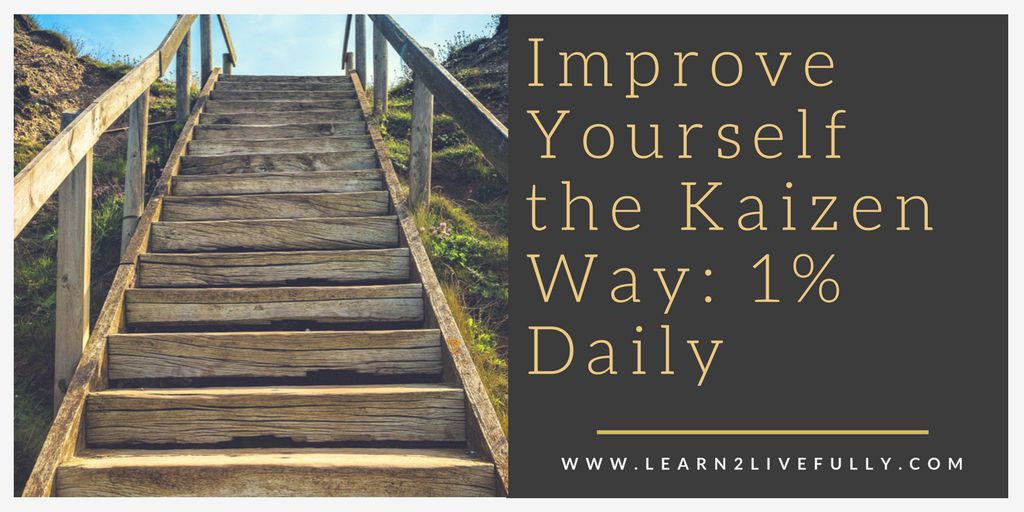
Do you often find yourself failing to change a habit or meet your goals? We all love to make big leaps when it comes to improving ourselves. We want to switch to a healthy diet from tomorrow. We like to get up early morning at four o’clock from New Year. We want to exercise 30 minutes daily from this week. Are you a person who often make New Year resolutions and forget about it after a couple of weeks? Then, read on to know how to improve yourself the Kaizen way.
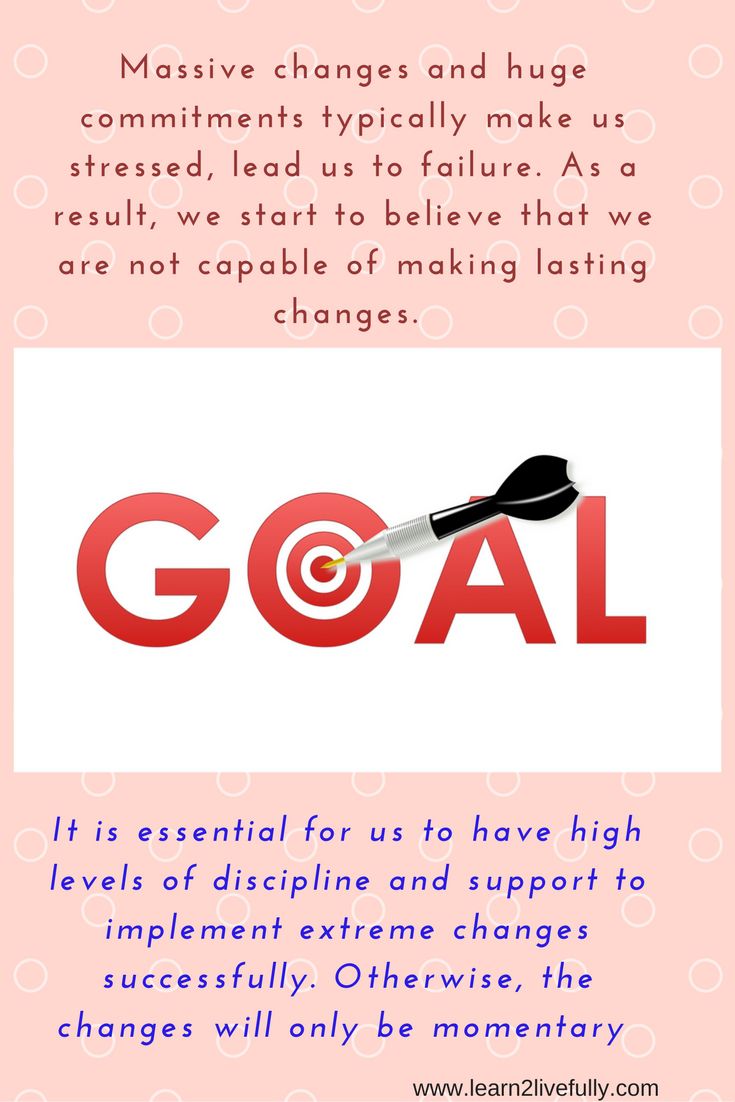
Massive changes and huge commitments typically make us stressed, lead us to failure. As a result, we start to believe that we are not capable of making lasting changes.
Last Monday, Jimmy checked his weight after a long time. He was 10 kg overweight. It was a jolt for him. He decided to reduce his excess weight in 6 months. Decided to quit eating meat, fried items, Coca-Cola. Jimmy switched to an extreme diet. Being fit again, was an enough motivation for him to stay on his new diet.
But after three days, he had to dine out with his teammates at a restaurant famous for its chickens. There, he got tempted to eat fried chicken. He broke his diet plan and ate chicken. Slowly, over days, he returned to his previous eating habits.
Why did Jimmy fail on his diet? He had all the motivation and desire to get back to shape. Jimmy failed because of the extreme diet. Drastic changes are scary! One small diet variation triggered thoughts of failure. That led him to blow off all his plans.
What could Jimmy try differently to achieve his goal? What if he tried to improve the Kaizen way?
What is Kaizen?
Before looking into how to improve yourself the kaizen way, let’s understand Kaizen Philosophy.
Kaizen is a Japanese philosophy of continuous improvement, eliminating waste. Kaizen helped Japan get back on its feet after the terrible demolition it faced during the Second World War. Mr. Masaaki Imai is the founding father of the Kaizen philosophy. His book titled “Kaizen: The Key to Japan’s Competitive Success” is considered the Kaizen Bible all over the world.
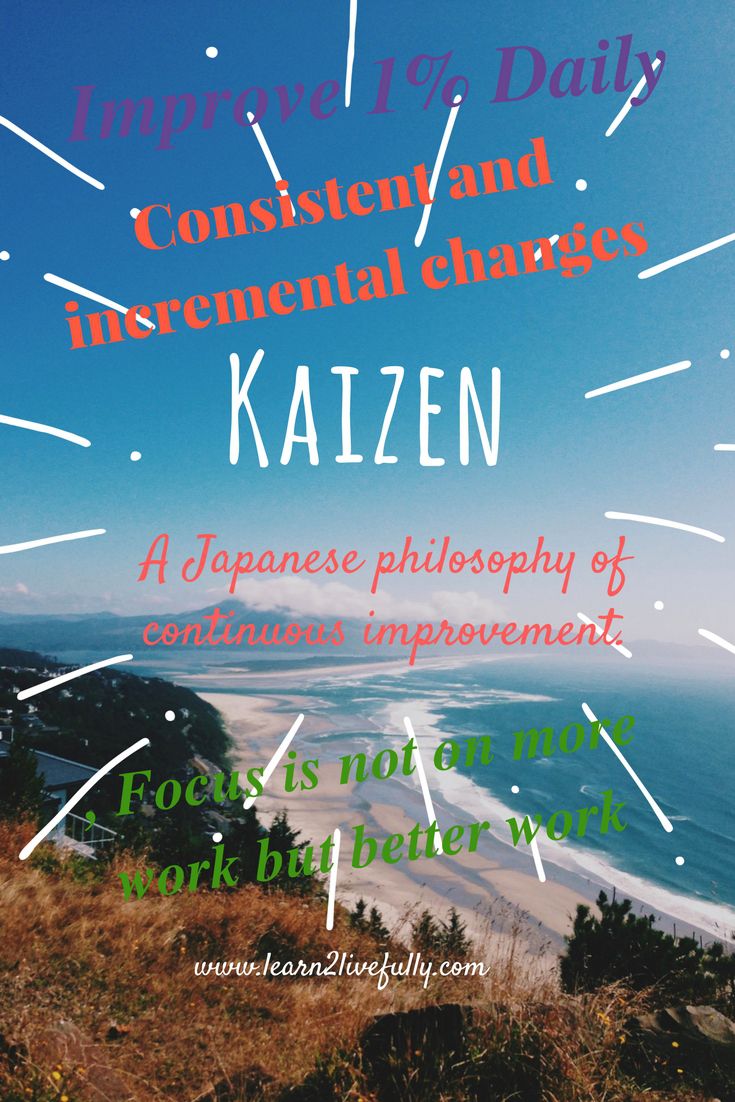
Many Japanese business organizations like Toyota uses Kaizen, as one of its central business philosophy. Now, many corporates across the globe use Kaizen strategy to deliver products with high quality. With Kaizen approach, the focus is not on more work but better work. Quality matters more than quantity.
Kaizen is a combination of two Japanese terms “Kai” and “Zen.” Kai means change. Zen means good. The general interpretation of Kaizen is “change for the better.” Another translation is “Continuous Improvement.”
You may check out kaizen.com for more details.
Why do you need to try the Kaizen methodology?

It is natural for us as humans to feel threatened because of rapid change. We feel stressed, and our brains start looking for ways to fight or flee. We tend to come back to the familiar setting.
It is essential for us to have high levels of discipline and support to implement extreme changes successfully. Otherwise, the changes will only be momentary. Making drastic changes is the reason behind the high failure rate in building new habits and breaking bad habits.
Kaizen has proven to be very effective. When you improve yourself the Kaizen way, you are making only small changes at a time.
Is Kaizen for you?
At times, we all have to face unexpected events and quick changes. Some of us are so disciplined and strong that they can make massive changes quickly and successfully.
Commonly, the enormity of our goals can overwhelm us and lead to inaction. Subconsciously, all of us feel comfortable with the stable and familiar options, rather than the unknown and possibly surprising ones.
Do massive changes and giant commitments scare you? Improve yourself the Kaizen way.
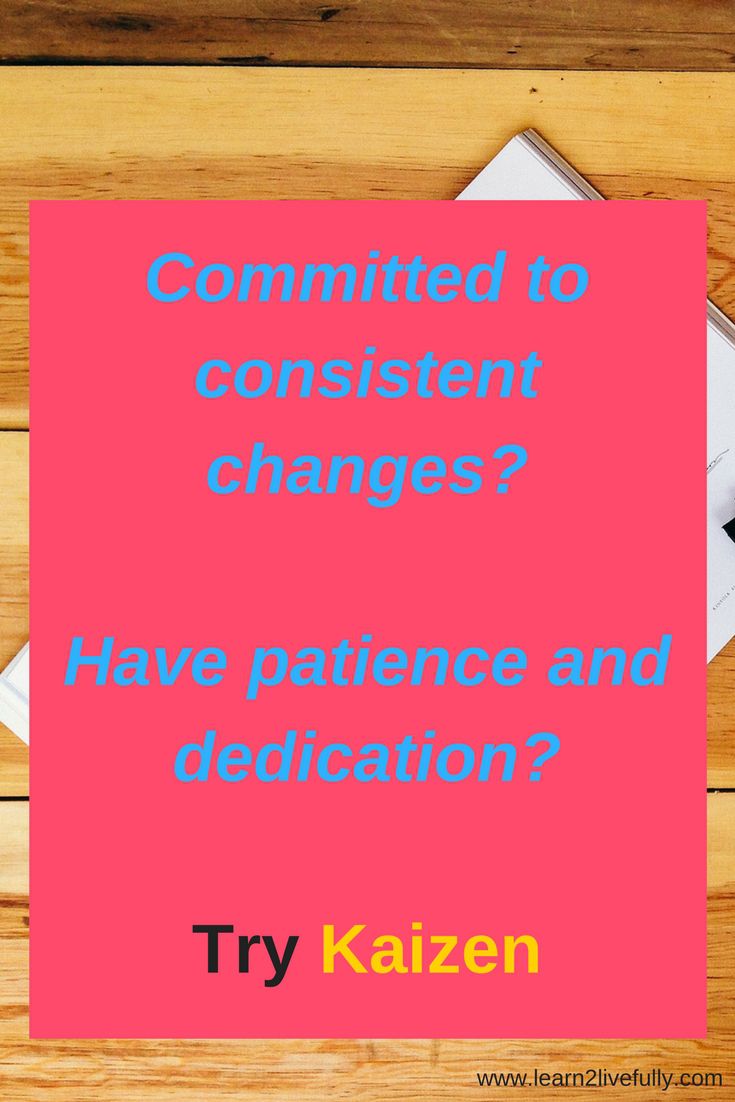
When you improve yourself the Kaizen way, you need to make consistent and incremental changes, producing positive results steadily over time. Even when you start having some success, you have to maintain it and keep on taking the next small steps. According to Kaizen, Self-improvement is not an end. We are always “work in progress.”
Are you committed to success and consistent changes? If not, Kaizen is certainly not for you.
If you lack patience and dedication to your continuous improvement, Kaizen is not for you.
Why is it more efficient to improve yourself the Kaizen way?
The whole focus of Kaizen approach is to take small steps each day. Every day we progress by 1%.
We taste success in each step you take. Thus the Kaizen approach helps to reprogram our brain, and we stop fearing the new behaviors and patterns. When we take small steps each day, our brain creates new neuron connections.
With commitment and patience to improve yourself the Kaizen way, you can make significant changes in your life and build new habits.
Kaizen Mindset
Kaizen Mindset requires you to keep moving in the improvement path even when you taste success. In that sense, Kaizen is not for the faint-hearted.
The aim of Kaizen is not to reach a goal and then relax at having achieved success. According to Kaizen, success is not a destination; it is part of the never-ending journey of improvement. To improve yourself the Kaizen way, you need to have a journey focused mindset, not a goal focused mindset.
The very essence of Kaizen lies in the evaluation of the improvement process to refine and rebuild the process to make it better. Using Kaizen is like finding a way to accomplish your dream and then seeing how you could make it even better. It is continually setting the bar higher and daring yourself to reach the mark.
How to improve yourself the Kaizen way?
Kaizen self-improvement recognizes that lasting change comes gradually. To improve yourself the Kaizen way, you must make small incremental changes to create significant impact over a period.
Steps of Kaizen
The Kaizen approach uses the PDCA Cycle. What is PDCA? Plan Do Check Act. These are the four steps you should take to improve yourself the Kaizen way.
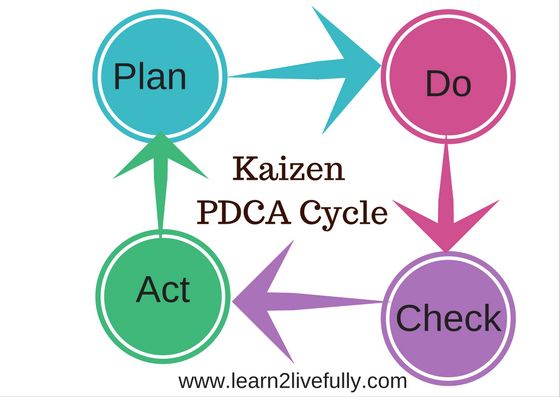
Plan
Assess different areas of your life which require improvements. Or evaluate your dreams. When you plan to achieve a goal or make a change using Kaizen, it is important the changes are in line with your purpose or vision.
Pick one most important improvement you want in your life. One principle you can use to identify the most important change is 80/20 principle.
The 80/ 20 Rule or the Pareto Principle was developed by Joseph Juran, a management theorist.
The theory behind this is that a large percentage of the results in any circumstance can be determined by at least 20% of the causes. It means that 80% of the results comes from 20% of the input. In reality, the ratio might vary.
When you analyze your personal life for possible improvements, you can follow 80/20 principle. The key here is to concentrate on the areas or activities, which will lead to the best results for your happiness. So if you improve on such activities, you can bring in significant changes to your life.
For example, are you worried about the politics in your office and not having good career growth? Instead of setting a goal to get a promotion, a job change would bring better results in your life.
In the planning phase, below are the important questions to be asked:
Why do you want to have this improvement in your life?
What problem do you have with it?
What is the result you want to achieve from this improvement?
Have the outcome concrete in your mind. Instead of setting big goals like, “I want to save $1200 more in 2017.”
Break the big goal into small, measurable steps.
Write down your new small goal: “I will save $100 extra every month.”
Remember, Kaizen approach is to enhance your life 1% every day.
Hence, this can be further broken down into a smaller, more practical actionable step like below:
“I will save $3.5 every day by cutting down the number of cigarettes, soda drinks, or extra coffees.” Now you have defined the small measurable, realistic time-bound step.
Do
Do is the step where you implement the plan. You will be making a small change to your lifestyle by starting a new behavior.
Now your challenge is to make this repeatedly happen so that the new behavior becomes a habit.
Occasionally, we might end up backtracking and revert to old habits.
Emotions drive us. We might feel optimistic, enthusiastic some days. Sometimes, we might feel lethargic, sick or experience stressful events. It is natural for us to backpedal once in a while. It is okay!
The important thing is that even when you make negative progress on a day, you are just missing 1% improvement. Long-term growth is still positive. So do bounce back the next day.
Check
In this step, your job is to evaluate the results from the second stage. You can have a weekly review to introspect. You need to ask questions like:
What went well in the second phase?
What did not go well?
What could you do differently?
You can compare the attained results from the second step with your planned desired outcome.
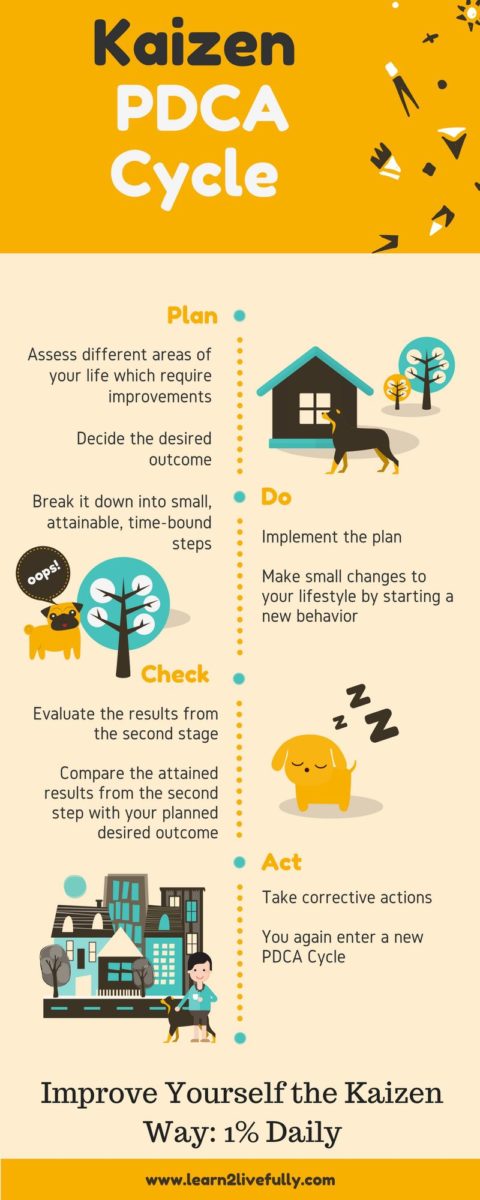
Act
In this fourth phase, you are taking corrective actions.
If you attained the preferred result from the second step, you could continue with the plan, and this new behavior becomes your new baseline standard.
If the new action did not work as expected, you could go back to old behavior, or you can switch to a new change or goal.
The significance of Act Phase is that you again enter a new PDCA Cycle.
After all, we are all “work in progress,” and improvement is a lifelong process.
Let’s get back to Jimmy’s diet. How can Jimmy use the Kaizen approach to change his diet?
Instead of making a sudden significant change like skipping all fried foods, meats. Jimmy has to make small, attainable steps by following PDCA cycle.
He can start with one change at a time. Maybe he can replace Coca-Cola with water for a couple of weeks. Once this new drinking habit gets stabilized, he can make one more positive change to diet. This approach will reduce his weight over time. He can also switch to an entirely healthy diet in the long-run.
Kaizen does not require you to alter your daily routine radically. You keep getting better 1% every day. What small changes are you going to do today to improve yourself the Kaizen way? What self-improvement techniques do you follow? Were you able to succeed as per your plan? Would you like to share your thoughts on self –improvement? Please comment below.
- Share:
You may also like

How To Define Your Meaning Of Success?

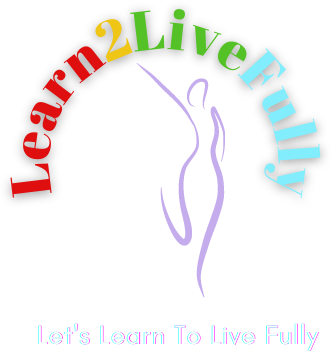


Comments
How interesting. I had never heard of Kaizen before today. I do not like big changes, so I’ll have to look into this.
Great post, definitely a great eye opener to a lot of people. It’s hard to avoid the feeling of failing, for some reason you feel like you are failing especially if you are not notice nor appreciated.
I try to be as realistic as possible when setting goals for myself. I am totally down with the Kaizen methodology! That 1% improvement each day is a beautiful way to put it and it seems logical. Thanks for sharing.
http://www.travelbeautyblog.com
I am familiar with the Kaizen method in the corporate arena, but I never thought about using it in my personal life. What a novel idea! I also think having an accountability partner works wonders! Thanks.
Very informative and interesting.I had never heard of Kaizen before but it’s good way how to improve yourself. Thank you!!
I never heard of Kaizen before. I persobally do better with a big leap versuspect slow steps. If I ate out shortly after starting a diet I wouldn’t throw in the towel and give up. I think people just look for an excuse or easy way out. You have to be determined and focused and if you slip then get up and do it again.
I like this idea. I’ve never heard of the name before but the process yes.
I’ve read this book before and it is very informative. I even subconsciously applied it to my everyday work and lifestyle. Stay on the goal and dont mind with those distractions.
I find Kaizen very interested. I have never heard before. I really like the method behind it. I would rather keep working at something instead of just stopping once the initial goal is met.
I studied about the Kaizen method in my Supply Chain & Operations class during management studies and I try to apply the same in various areas of my life. Continuous improvement not only helps you to be on your toes but it also helps you to be better every single day!
This is such a great post. I do a lot of personal Development posts on my page Mommy’s Mid-Life Quest and I’m planning to share this next week. Thanks for posting!
Thanks a lot Patty for sharing this post. I am looking forward to read it.
Sigh! Reading this makes me feel like I want a relieve. I can’t wait to be on track with my life.
What an interesting post!!! This is the first time I’ve ever heard of Kaizen! I’m all about bettering myself though!
Thank you for an additional excellent post. Exactly where else could anybody get that kind of facts in this kind of a ideal way of writing? I’ve a presentation next week, and I’m about the appear for this kind of data.
Awesome post! This concept is so important for so many of us. What you do every day is far more important than what you do sometimes. Here is a blog post I created that I feel can help your readers reach their goals http://positivitygym.com/5-ways-to-keep-your-new-years-resolutions/. Keep up the great writing. You have a very important message to spread, keep spreading it!
1% doesn’t look like much but if you commit to it on a daily basis, 1% can be a lot. First time I hear about the Kaizen way, very informative post.